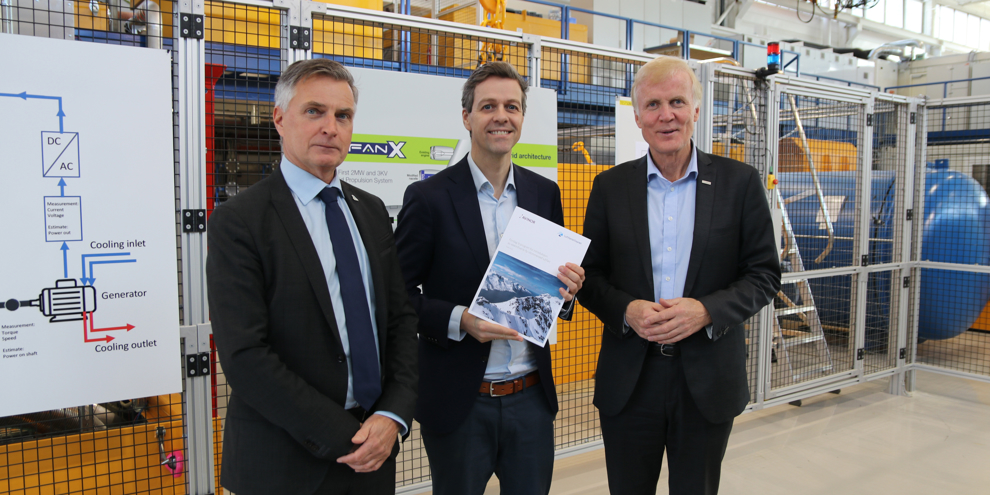Norway – a driving force and arena for electrification of air travel

The Norwegian Ministry of Transport has commissioned Avinor and the Norwegian Civil Aviation Authority to develop a proposed program for the introduction of electrified aircraft. The report suggests that by 2030, the first regular domestic scheduled flights in Norway will be operated with electrified aircraft.
Furthermore, it recommends a package of incentives and measures, which will help achieve the proposed objective that by 2040, all domestic aviation in Norway will be operated with electrified aircraft.
– The world is facing a climate crisis and it is up to us in the transportation sector to make the biggest reductions in emissions. Helping to achieve this is my primary task as Minister of Transport and Communications. We must deliver on this, and electric aircraft may be part of the solution. I am now looking forward to reading the proposal for electric aircraft program prepared by Avinor and the Norwegian Civil Aviation Authority, says Knut Arild Hareide, Minister of Transport and Communications.
The report was handed over to the Minister at an event hosted by the aircraft engine manufacturer Rolls-Royce in Trondheim on the 5th of March.
– The assignment given to Avinor and the Norwegian Civil Aviation Authority by the Norwegian government has now been completed and the conclusions are extremely clear. Our recommendation is that Norway should be one of the main arenas in the world for the electrification of air travel, says CEO of Avinor, Dag Falk-Petersen.
– In order to ensure that high-quality transport services continue to be provided in Norway, it is in Norway’s own interest – from the perspective of both climate, district and transport policies – that zero and low-emission aircraft are developed which are capable of operating on the unique Norwegian short-haul network under the prevailing meteorological conditions in the country, says Director General of Civil Aviation Authority of Norway, Lars Kobberstad.
The report recommends that the Government set very specific objectives and that these are supported by measures and instruments in order to achieve the objectives.
Suggested objectives
- Norway should be a driving force and arena for the development, testing and early implementation of electrified aircraft
- By 2030, the first ordinary domestic scheduled flights will be operated with electrified aircraft
- By 2040, all civil domestic aviation in Norway will be operated with electrified aircraft, reducing greenhouse gas emissions by at least 80% compared with 2020
A comprehensive package of measures
In order to achieve the objectives, Avinor and the Norwegian Civil Aviation Authority propose that a comprehensive package of measures is adopted which includes incentives regarding technology development, investment support and beneficial conditions during the operational phase. Such a package should be communicated as early as possible and be calculable and long-term.
– Norway's dependence on aviation, abundant access to renewable electricity, unique short-haul network, active and interested stakeholders and political will to electrify the transport sector, makes Norway both well-suited and recognized as a very interesting test area and the first market for electrification of aviation. Therefore, it is important that Norway adopts a package of measure as quickly as possible, explains Falk-Petersen.
International innovation cooperation
One of the concrete measures proposed to drive forward technological development is an international cooperation forum. A task force (High-Level Task Force for Zero Emission Aviation) with key European agencies (European Union Aviation Safety Agency EASA, the Norwegian Civil Aviation Authority, Airbus, Leonardo, Safran, Avinor, SAS and Widerøe) has already been established following the Norwegian Civil Aviation Authority initiated an expanded collaboration with the European Union Aviation Safety Agency - EASA. By the summer of 2020, the task force will prepare and present a roadmap for innovation related to zero and low-emission regional aircraft.
It is recommended that the roadmap and associated recommendations form the basis for further measures and that relevant aspects be incorporated into the work relating to the National Transport Plan (NTP 2022-2033).
International centre for development
In order to address and further develop the task force’s roadmap, it is recommended that an international arena is established in Norway for the development, testing and implementation of zero and low-emission aviation technology.
Investment support
Investment in new aircraft is a strategically important decision for airlines, and there is a lot of capital tied up to this. In a transitional period in which electric aircraft will be new to the market, the acquisition of such aircraft is associated with risk. Therefore, several risk-alleviating measures are recommended that may be applicable:
- Considering appropriate support schemes for the purchase of new aircraft
- Creating grant schemes for the establishment of aircraft charging infrastructure
- VAT exemption for light aircrafts
Attractive tax regime during the operational phase
In order to help make it profitable for airlines to invest in electrification, it is suggested that the government provide clear signals that the tax system will be adapted so that travels with zero or low-emission aircraft become relatively more affordable than flights with conventional aircraft:
- Exemption from or reductions in VAT on tickets for air travel by zero and/or low-emission aircraft through to 2040 (possibly with re-evaluation in 2035).
- Exemption from or reductions in air passenger tax for zero and/or low-emission aircraft through to 2040 (possibly with re-evaluation in 2035).
- Take off charges to Avinor is adjusted to provide incentives for the use of electrified aircraft (assessed in accordance with EU regulations).
- Reduction in electricity tax for aircraft used in commercial operations in accordance with a model taken from the shipping sector.
– In order for us to achieve the climate targets Norway has committed to in the Paris Agreement, the Norwegian aviation industry must succeed in this. Aviation should be part of the climate solution, not the climate problem, concludes Kobberstad.